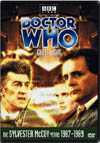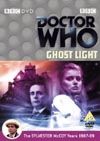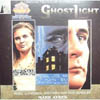DVD Extras include:
The narrative really lacks any obvious purpose, and the characters of this tale suffer the same chief problem as those of "Battlefield" (the previous story), in not having goals that are clear enough to get the audience to want to invest in them and root for them. This is particularly acute for our two TARDIS-traveling regulars. Ace and the audience are forced to muck about in a half-hearted exploration of the house without knowing why, while the Doctor has a good reason which he shares with no one. Interest could easily go up several notches if we had a chance to get inside the Doctor's head from the start and share his questions and curiosity, but the wedge of secrecy that is driven between him and his companion, who is the audience's only available proxy at this point, denies us what we need. "Snakedance" (story no. 125) was far more effective with its more populated TARDIS, because the Doctor could confide his questions to the audience via Nyssa, while carefully peeling back the layers of Tegan's nightmare. I think we should also note that even when stuck with a duo instead of a trio, there are avenues for success. Ace's discomfort towards clowns was much better dealt with in "The Greatest Show in the Galaxy" (story no. 155), where it could be properly set-up in such a way as to help draw the audience into the story and emotionally invest in Ace's participation in it. This story's attempts to cash-in on the archetypal draw of haunted house stories also seems marred by its failure to do anything with the barrier between inside and outside - perhaps a casualty of the now stale practice to shoot another story of the season all on location while forcing this one to be studio only. Typically in haunted-house stories, much is made from rumours about what the house may or may not contain, all leading up to our main protagonists' entrance into the house, and then getting some mileage out of the fact that leaving the house again is not as easy at it probably should be. But "Ghost Light" unceremoniously deposits our regulars into its house with a very lacklustre TARDIS materialization, and doesn't make any attempt to prevent their departure, or motivate a choice of departing or staying. Neither does this story make any use of the TARDIS being in the house to resolve any of the issues therein. A really bland, unengaging waste all around. Even Scooby-Doo cartoons typically make better use of haunted houses. I think the TARDIS should have landed outside the grounds of this house, to increase the stakes of the story and the supposed jeopardy to the Doctor and Ace while they remained in the house. ...If only that was all that was wrong with this tale. The extraordinary nature of the characters and the goings-on in this house also lack impact simply because there is so little sense of anything humanly normal anywhere nearby. Horror (and for that matter, good sci-fi), needs a straight reality out of which the extraordinary can be explored. But the best that "Ghost Light" seems to manage is a sort of exaggerated British etiquette and ritual, one that is already too intimately merged with the extraordinary. Writer Marc Platt deserves some points for his dialogue, as he displays great talent for making the lines both economic and poetic most of the time. (You can hear the "but" coming, can't you?) Yes, but, in this very dialogue-driven story, there are far too many incredibly short scenes. The characters and their dialogue don't get nearly enough room to breathe. It's as if every third line is trying to twist the plot to a new direction, which doesn't impact the audience, since they haven't yet figured out what direction the plot was trying to go in just before. We need more long scenes, especially near the beginning to get to know the characters and where each of them would like to be headed.
Tea Time for DarwinThe directionless cramming is perhaps most obvious when one looks at what the story does with its prominent evolution vs. religion motif, arguably the strongest overarching theme in the piece. I can vividly remember getting very interested in evolutionary debate in the early 1990's, and suddenly hitting upon the idea of viewing "Ghost Light" again to see what it had to say on the subject. Perhaps there might even be a few profound quotes in it, neatly encapsulating or advancing the best of either side of the argument.Well, for any degree of seriousness on this subject, "Ghost Light" turns out to be a dismal disappointment. Immediately noticeable is the fact that the Reverend Matthews arrives in the house early enough in the story to be a major protagonist, and he is eager to rip straight into such a debate from the start. But for the next two episodes, he is unable to get a scene with a proper conversation on the subject, as an unending series of distractions keeps the entire cast running around like headless chickens. What few economic one-liners manage to get hurled through this dizzying dance typically suffer from having each side trying to define the other instead of themselves, resulting in the kind of unengaging mud-slinging that currently turns most voters off of politics. Really, the characters in this dialogue-driven tale haven't been created to captivate us with arguments. They've been created as symbols in the evolution vs. religion struggle, and their conflict isn't played out in dialogue. It is instead transplanted into a very British tea-time who-done-what mystery. And it should also be pointed out that this story's symbols pit Darwinian evolution against religion, whereas the engaging debate should actually be evolution vs. creationism. Most of the positive arguments that could arise from the side of proactive intelligence creating species and other things in the universe that it truly wants - such aspects completely escape the dynamics of "Ghost Light", which is much more about fear of change hiding behind dogma.
"Even I can't play this many games at once!"The mechanics of the mystery and plot suffer significantly because so many of the characters have abilities and powers that never truly get defined - more time and space is needed to explore such concepts properly. What do these characters want, and what exactly is preventing them from reaching their goals? Which of them should the audience root for, and who should we want to see defeated? All this remains far too obscure. While "Battlefield" (the previously story) reflects very similar character problems, it at least thrived on a fun and uplifting atmosphere, which I liked. In "Ghost Light", the atmosphere is dark and creepy, which I find far less tolerable when basic story mechanics begin to fail. Each Doctor Who fan will have to look at his or her own tastes to decide which of these two stories they like better.Are the aliens here ultimately believable? I would say far less so than those of "The Greatest Show in the Galaxy" (story no. 155), but I'll have to save the details of my argument for the in-depth analysis version of this review to avoid spoilers in both stories.
This story is available on DVD and VHS video. Click on the Amazon symbol for the location nearest you for pricing and availability:
Comments on this article are welcome. You may contact the author from this page:
|










